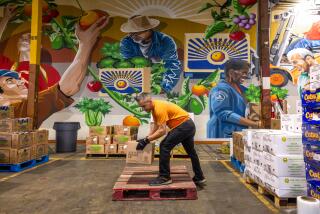Amazon is testing farmers market produce delivery
Imagine getting greens and herbs from Maggie’s Farm, Mangalitsa pork from Peads & Barnetts, black cod from Wild Local Seafood and melons from Weiser Family Farms all delivered to your doorstep within 36 hours of harvest, ordered with just a mouse click.
That’s what’s coming to Southern California as Amazon rolls out its new Farmers Market Direct program, in partnership with Fresh Nation.
A trial program for a new business model that could be expanded nationally in the near future, it promises to bring customers high-quality locally grown produce even if they can’t get to a farmers market every week.
What’s in season? It’s all here
Fresh Nation now delivers through Amazon in Los Angeles, Orange and San Diego counties. Fresh fruit and vegetable baskets and individual orders are available.
The baskets, which contain an assortment of either fruit or vegetables or both, are available in large ($59) and small ($39) sizes, with delivery included.
It’s the brainchild of former techie Tony Lee, who took a break from a career in e-commerce to manage a farmers market in his hometown of Danbury, Conn., and then fell in love with the business.
“The thing that I learned was that oftentimes the vendors weren’t making enough money to keep going,” he says. “I became very friendly with a lot of them and I grew to appreciate how passionate they were about their business. They are amazing people.
“But because farmers markets are only open for a few hours a week, there wasn’t enough time for people who want fresh local food to get it.
“Making fresh local food more available to more people on the one hand and on the other bringing more business to these small farmers and food producers — that’s our mission,” he says. “We want to get millions of people eating fresh local food and having access to it every day.”
Lee says he first created a huge database of farmers market vendors across the country, then organized it to create a rational supply chain. The company ran tests in Southern California and on the East Coast and when it had the bugs worked out, went to Amazon, which already has a grocery delivery service up and running in Amazon Fresh.
“We created our partnership with Amazon because Amazon already brings fresh foods to millions of people,” Lee says. “So far Amazon has been unbelievably supportive of our efforts to bring fresh local foods to their customers. It seemed to us to be a win-win to form this partnership with them.”
The individual offerings are widely varied and in most cases prices are only a little higher than they would be at the market, though there is a delivery fee tacked on for orders of less than $50.
Almonds from Fat Uncle Farms are $6.85 for a four-ounce bag. Assorted bell peppers from Fresno Evergreen are $3.50 a pound. Blackberries from Pudwill Berry Farm are $5.60 per six-ounce basket. Locally caught swordfish from Wild Local Seafood is $28 a pound.
Some of the food will have been purchased in advance by Fresh Nation buyers, filling anticipated orders. Others will be purchased as the orders come in.
“The idea is that we’re benefiting the vendors, never cannibalizing their sales,” Lee says. “We never want to take sales away from them that they would have gotten through farmers markets. When they sell to us, it’s extra sales.”
A somewhat similar program in Southern California, Good Eggs, crashed earlier this month. But that doesn’t bother Lee.
“I think Good Eggs was selling fantastic food from great vendors, but their underlying model is very different to ours,” Lee says. “I don’t think it was a question of the quality of the food they were selling. I think it is more a question of how one frames the business and what model may be more sustainable in the long run.”
Are you a food geek? Follow me on Twitter @russ_parsons1
Here’s how to find great grapes
Is sustainable ground beef really safer?
More to Read
Eat your way across L.A.
Get our weekly Tasting Notes newsletter for reviews, news and more.
You may occasionally receive promotional content from the Los Angeles Times.











